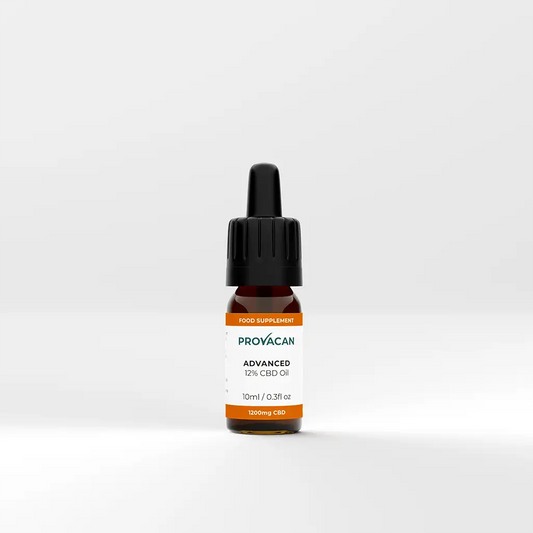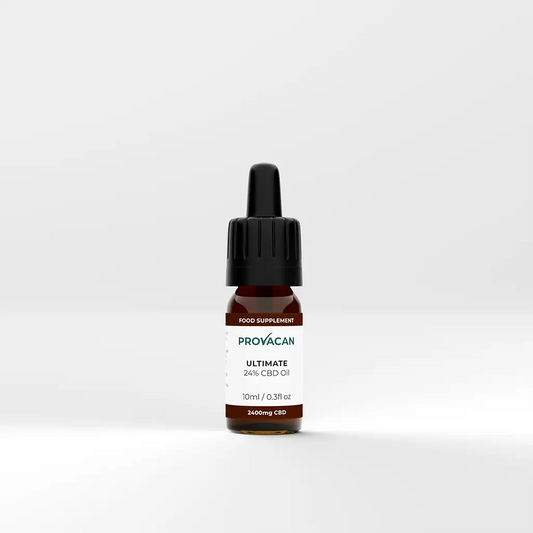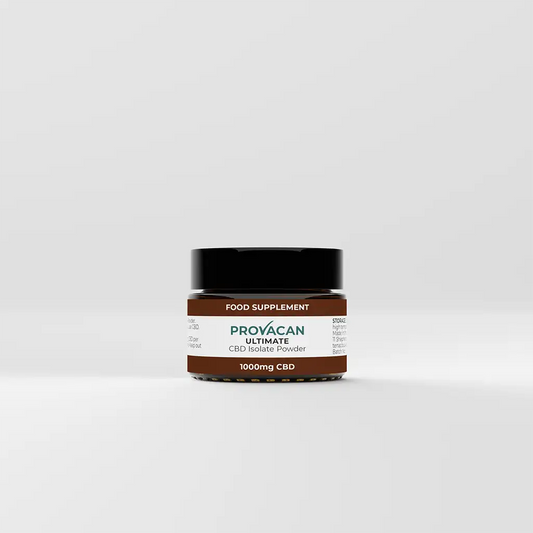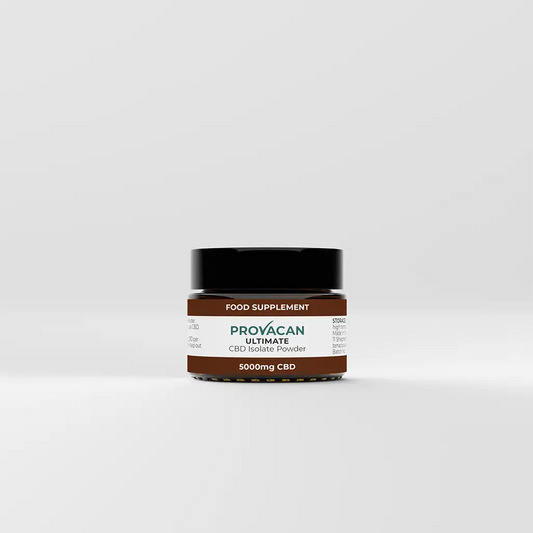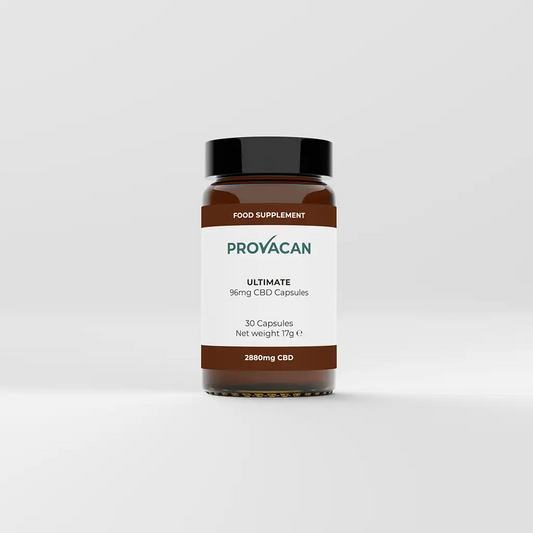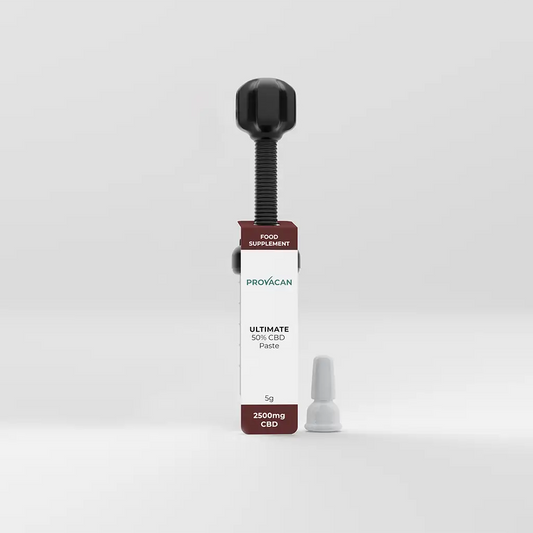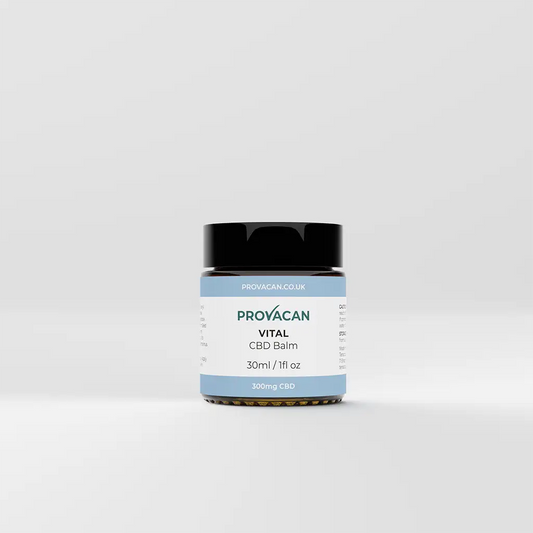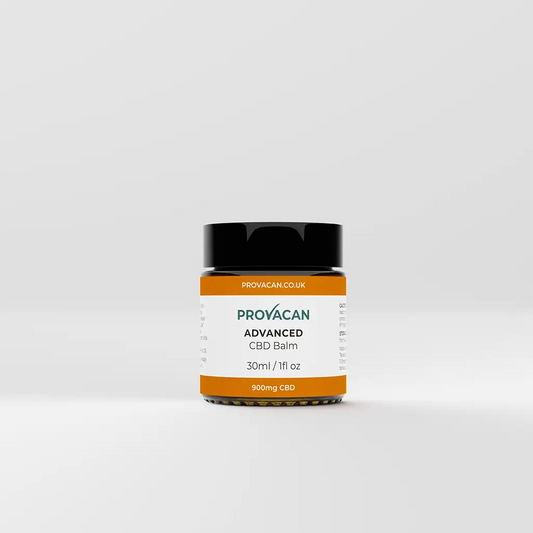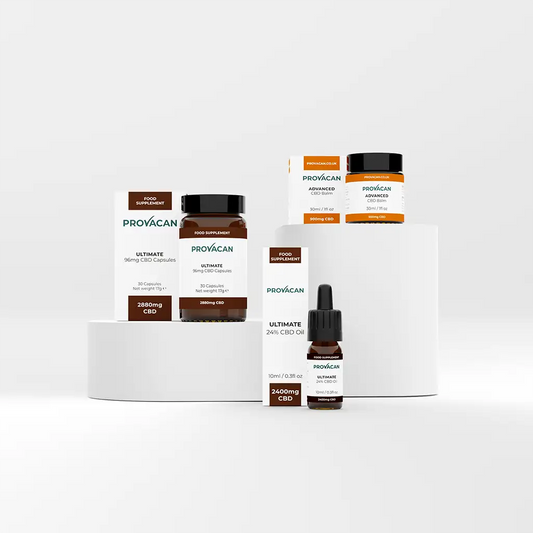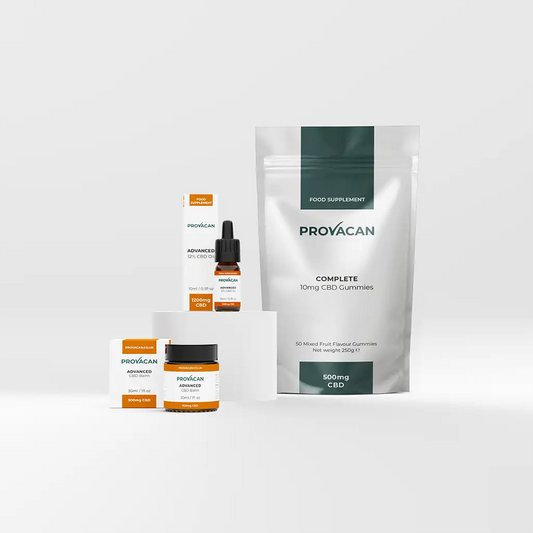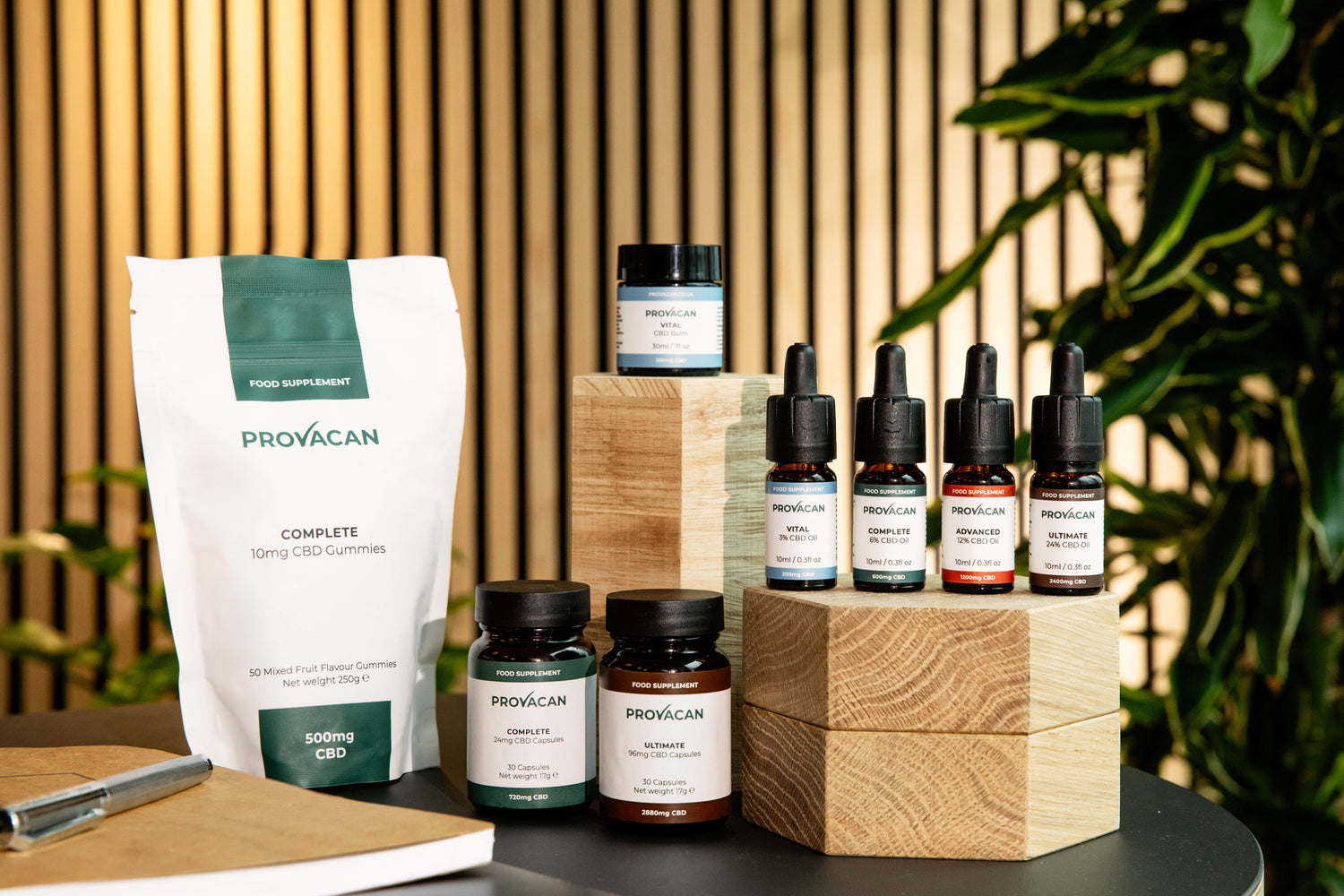Collection: CBD For Relief
-
Provacan Advanced CBD Oil | 1200mg / 12% CBD, 10ml
Regular price £49.99 GBPRegular priceUnit price / per -
Provacan Ultimate CBD Oil | 2400mg / 24% CBD, 10ml
Regular price £79.99 GBPRegular priceUnit price / per -
Provacan Ultimate CBD Isolate | 1000mg / 1g CBD
Regular price £22.99 GBPRegular priceUnit price / per -
Provacan Ultimate CBD Isolate | 5000mg / 5g CBD
Regular price £44.99 GBPRegular priceUnit price / per -
Provacan Ultimate CBD Capsules | 96mg CBD per capsule, 30 Pack
Regular price £89.99 GBPRegular priceUnit price / per -
Provacan Ultimate CBD Oil Paste | 2500mg / 50% CBD, 5g
Regular price £89.99 GBPRegular priceUnit price / per -
Provacan Vital CBD Balm 300mg CBD / 1% CBD, 30ml
Regular price £22.99 GBPRegular priceUnit price / per -
Provacan Advanced CBD Balm | 900mg / 3% CBD, 30ml
Regular price £39.99 GBPRegular priceUnit price / per -
Provacan Ultimate CBD Starter Kit
Regular price £139.99 GBPRegular priceUnit price / per£199.97 GBPSale price £139.99 GBPSale -
Provacan Advanced CBD Starter Kit
Regular price £89.99 GBPRegular priceUnit price / per£112.97 GBPSale price £89.99 GBPSale
Benefits of Using CBD for Pain Management
When it comes to managing pain, CBD has gained significant attention for its potential benefits. Research suggests that CBD, a non-intoxicating compound derived from the cannabis plant, may offer relief for various types of pain without the psychoactive effects commonly associated with THC.
1. Anti-Inflammatory Properties
One of the primary ways CBD may help manage pain is through its anti-inflammatory properties. Inflammation is a natural response by the immune system to injury or illness, but chronic inflammation can lead to pain and discomfort. CBD has been shown to reduce inflammation by interacting with receptors in the endocannabinoid system, potentially offering relief from conditions such as arthritis and muscle soreness.
2. Analgesic Effects
CBD may also act as an analgesic, helping to reduce pain sensation. By influencing neurotransmitter activity and blocking pain signals, CBD could potentially alleviate both acute and chronic pain. This makes CBD a promising option for individuals looking for natural alternatives to traditional pain management medications.
3. Muscle Relaxation
Muscle tension is a common source of pain and discomfort for many individuals. CBD's ability to promote relaxation and reduce muscle tension may help alleviate muscle spasms, cramps, and general stiffness. This can be particularly beneficial for athletes, individuals with physically demanding jobs, or those suffering from conditions like fibromyalgia.
4. Neuroprotective Properties
In addition to its pain-relieving effects, CBD has shown promise as a neuroprotective agent. By interacting with receptors in the brain and nervous system, CBD may help protect against nerve damage and alleviate neuropathic pain. This makes CBD a potentially valuable option for individuals with conditions such as multiple sclerosis or nerve-related pain disorders.
The potential benefits of using CBD for pain management are vast, offering a natural and effective alternative for individuals seeking relief from various types of pain.
Debunking Common Myths About CBD
Myth 1: CBD Gets You High
One of the most widespread misconceptions about CBD is that it produces a "high" similar to THC, the psychoactive component in cannabis. However, CBD is non-intoxicating and does not cause euphoria. It is important to note that high-quality CBD products like our Ultimate CBD Isolate contain only trace amounts of THC, well below the legal limit of 0.2% in the UK, ensuring that users can experience the potential therapeutic benefits without any psychoactive effects.
Myth 2: CBD Is Addictive
Contrary to popular belief, CBD is not addictive. Unlike THC, which can create dependency in some individuals, CBD is non-addictive and does not lead to substance abuse. In fact, studies have suggested that CBD may even help individuals manage addiction to other substances by mitigating withdrawal symptoms and cravings.
Myth 3: CBD Doesn't Work
While individual responses to CBD may vary, numerous studies have demonstrated the potential efficacy of CBD in managing various conditions, such as anxiety, chronic pain, inflammation, and even epilepsy. The key to experiencing the benefits of CBD lies in using high-quality products from reputable sources, like Provacan, that adhere to strict quality standards and provide transparent information about their products.
Myth 4: CBD Is Only for Severe Conditions
CBD is often associated with treating severe medical conditions, such as epilepsy or chronic pain. However, CBD can also be beneficial for everyday wellness and stress management. Many individuals use CBD as a natural supplement to support overall health and well-being, even if they do not have a specific medical condition.
By debunking these common myths about CBD, we aim to provide you with accurate information so you can make informed decisions about incorporating CBD into your wellness routine.
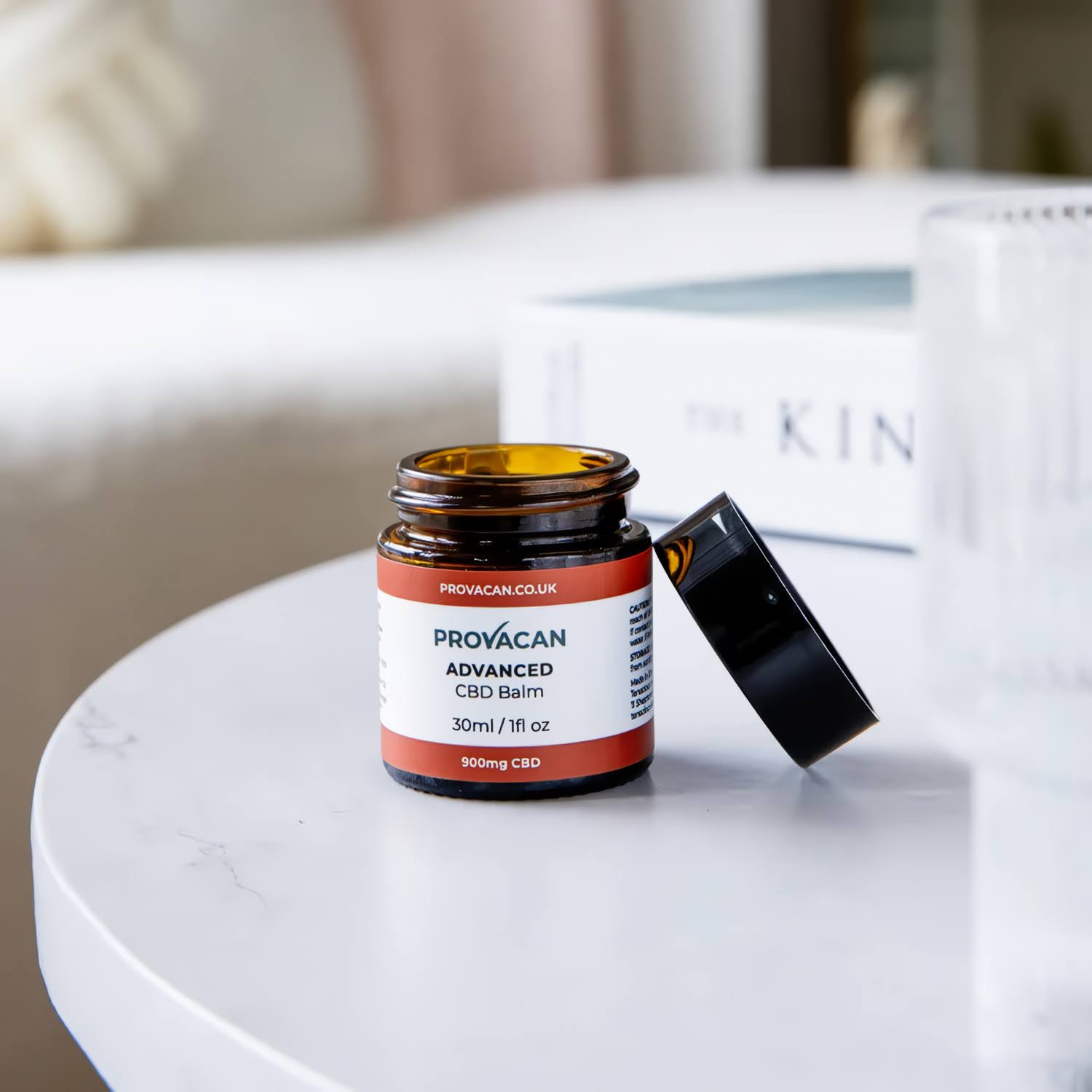
The Science Behind CBD
CBD, short for cannabidiol, is one of over 100 compounds known as cannabinoids found in the cannabis plant. Unlike its counterpart THC, CBD does not produce the psychoactive effects commonly associated with cannabis use.
The human body contains an endocannabinoid system (ECS), a complex network of receptors present throughout the brain, organs, connective tissues, glands, and immune cells. CBD interacts with these receptors, specifically the CB1 and CB2 receptors, to help regulate various processes such as mood, pain sensation, appetite, and immune response.
In terms of pain relief, CBD products that may reduce inflammation do so by interacting with neurotransmitters and inhibiting inflammatory responses. This anti-inflammatory action can be beneficial for conditions such as arthritis, muscle soreness, and chronic pain.
Moreover, CBD has shown promise in reducing anxiety and stress levels. It has been found to activate 5-HT1A receptors, a serotonin receptor known to regulate mood and social behaviour. By promoting a sense of calmness and relaxation, CBD may help individuals manage stress and anxiety more effectively.
Benefits of Using CBD for Pain Management
When it comes to managing pain, CBD has gained significant attention for its potential benefits. Research suggests that CBD, a non-intoxicating compound derived from the cannabis plant, may offer relief for various types of pain without the psychoactive effects commonly associated with THC.
1. Anti-Inflammatory Properties
One of the primary ways CBD may help manage pain is through its anti-inflammatory properties. Inflammation is a natural response by the immune system to injury or illness, but chronic inflammation can lead to pain and discomfort. CBD has been shown to reduce inflammation by interacting with receptors in the endocannabinoid system, potentially offering relief from conditions such as arthritis and muscle soreness.
2. Analgesic Effects
CBD may also act as an analgesic, helping to reduce pain sensation. By influencing neurotransmitter activity and blocking pain signals, CBD could potentially alleviate both acute and chronic pain. This makes CBD a promising option for individuals looking for natural alternatives to traditional pain management medications.
3. Muscle Relaxation
Muscle tension is a common source of pain and discomfort for many individuals. CBD's ability to promote relaxation and reduce muscle tension may help alleviate muscle spasms, cramps, and general stiffness. This can be particularly beneficial for athletes, individuals with physically demanding jobs, or those suffering from conditions like fibromyalgia.
4. Neuroprotective Properties
In addition to its pain-relieving effects, CBD has shown promise as a neuroprotective agent. By interacting with receptors in the brain and nervous system, CBD may help protect against nerve damage and alleviate neuropathic pain. This makes CBD a potentially valuable option for individuals with conditions such as multiple sclerosis or nerve-related pain disorders.
The potential benefits of using CBD for pain management are vast, offering a natural and effective alternative for individuals seeking relief from various types of pain.
Debunking Common Myths About CBD
Myth 1: CBD Gets You High
One of the most widespread misconceptions about CBD is that it produces a "high" similar to THC, the psychoactive component in cannabis. However, CBD is non-intoxicating and does not cause euphoria. It is important to note that high-quality CBD products like our Ultimate CBD Isolate contain only trace amounts of THC, well below the legal limit of 0.2% in the UK, ensuring that users can experience the potential therapeutic benefits without any psychoactive effects.
Myth 2: CBD Is Addictive
Contrary to popular belief, CBD is not addictive. Unlike THC, which can create dependency in some individuals, CBD is non-addictive and does not lead to substance abuse. In fact, studies have suggested that CBD may even help individuals manage addiction to other substances by mitigating withdrawal symptoms and cravings.
Myth 3: CBD Doesn't Work
While individual responses to CBD may vary, numerous studies have demonstrated the potential efficacy of CBD in managing various conditions, such as anxiety, chronic pain, inflammation, and even epilepsy. The key to experiencing the benefits of CBD lies in using high-quality products from reputable sources, like Provacan, that adhere to strict quality standards and provide transparent information about their products.
Myth 4: CBD Is Only for Severe Conditions
CBD is often associated with treating severe medical conditions, such as epilepsy or chronic pain. However, CBD can also be beneficial for everyday wellness and stress management. Many individuals use CBD as a natural supplement to support overall health and well-being, even if they do not have a specific medical condition.
By debunking these common myths about CBD, we aim to provide you with accurate information so you can make informed decisions about incorporating CBD into your wellness routine.
Is CBD Legal in the UK?
In the United Kingdom, CBD is legal as long as it meets certain requirements. CBD is considered legal in the UK when it comes from industrial hemp strains that are approved by the European Union. These strains contain very low levels of THC, the psychoactive compound found in cannabis.
According to UK law, CBD products must contain less than 0.2% THC to be legally sold and consumed. CBD products that meet this criteria are classified as food supplements and are widely available for purchase both online and in stores throughout the UK.
Provacan follows stringent quality control measures to ensure the legality, purity, and potency of our CBD products. Our CBD isolate is derived from 100% organic, non-GMO hemp plants that are cultivated using sustainable farming practices without the use of pesticides, herbicides, or chemical fertilisers.
It is important for consumers to ensure that the CBD products they purchase comply with THC limits and are from reputable sources to avoid any legal issues. Additionally, it is recommended to seek advice from a healthcare professional before using CBD products for therapeutic purposes.
How to Choose the Right CBD Product for Pain Relief
When looking for CBD products to help with pain relief, it's essential to consider several factors to ensure you select the right one for your needs. Here are some key points to keep in mind:
CBD Concentration
The concentration of CBD in a product is crucial in determining its potency. Higher concentrations may be more effective for managing pain, but it's always best to start with lower concentrations if you're new to CBD to gauge your body's response.
Full Spectrum vs. Isolate
Full-spectrum CBD products contain a range of cannabinoids, terpenes, and other beneficial compounds found in the cannabis plant. This is known as the entourage effect, where these compounds work together to enhance the therapeutic benefits.
On the other hand, CBD isolates contain only pure CBD without any other compounds. Consider your preferences and sensitivities when choosing between full spectrum and isolate CBD products for pain relief.
Third-Party Testing
Look for CBD products that undergo third-party testing by independent laboratories. This testing ensures that the product is free of contaminants and accurately labeled. Transparency about the testing results indicates a reputable company that prioritises quality and safety.
Delivery Method
CBD products come in various forms, including CBD oils, capsules, topicals like our Advanced CBD Balm, and gummies. Consider your preference for ingestion and the targeted area of pain when selecting a delivery method. Each method has its unique bioavailability, absorption rate, and duration of effects.
By keeping these factors in mind and doing thorough research on different CBD products, you can make an informed decision to choose the right CBD product for pain relief that suits your individual needs and preferences.
Embrace the Power of CBD for Relief
CBD has emerged as a promising natural remedy for various physical and mental health concerns. With its potential to offer relief from pain, anxiety, inflammation, and more, CBD products have gained popularity among those seeking a holistic approach to well-being. Provacan, the UK's leading CBD innovator, is committed to delivering high-quality products backed by scientific research to ensure the utmost effectiveness and purity.
By choosing products like Provacan’s Ultimate CBD Starter Kit, you are not only prioritising your well-being but also supporting a company that values transparency, quality, and customer satisfaction. Our dedication to excellence in extraction methods and product formulation sets us apart in the CBD industry, providing you with a sense of assurance that you are investing in a reliable and reputable brand.
Collapsible content
What is CBD?
CBD, short for cannabidiol, is a naturally occurring compound found in the cannabis plant. It is non-intoxicating and has various potential health benefits.
How does CBD provide relief?
CBD interacts with the endocannabinoid system in the body to help regulate various functions like pain, inflammation, and mood, potentially providing relief in these areas.
Is CBD legal?
In the UK, CBD products are legal as long as they meet certain standards and have a THC content of less than 0.2%.
Can CBD help with pain management?
Many people use CBD for pain relief, as it is believed to have anti-inflammatory and analgesic properties.
What forms does CBD come in?
CBD products can come in various forms including oils, tinctures, capsules, edibles, topicals, and more.
How do I choose the right CBD product?
When choosing a CBD product, consider factors like potency, form, quality, and the reason you are using it for.
Sources:
- Freeman T P, Hindocha C, Green S F, Bloomfield M A P. Medicinal use of cannabis based products and cannabinoids BMJ 2019; 365 :l1141 doi:10.1136/bmj.l1141
- Wang L, Hong P J, May C, Rehman Y, Oparin Y, Hong C J et al. Medical cannabis or cannabinoids for chronic non-cancer and cancer related pain: a systematic review and meta-analysis of randomised clinical trials BMJ 2021; 374 :n1034 doi:10.1136/bmj.n1034

